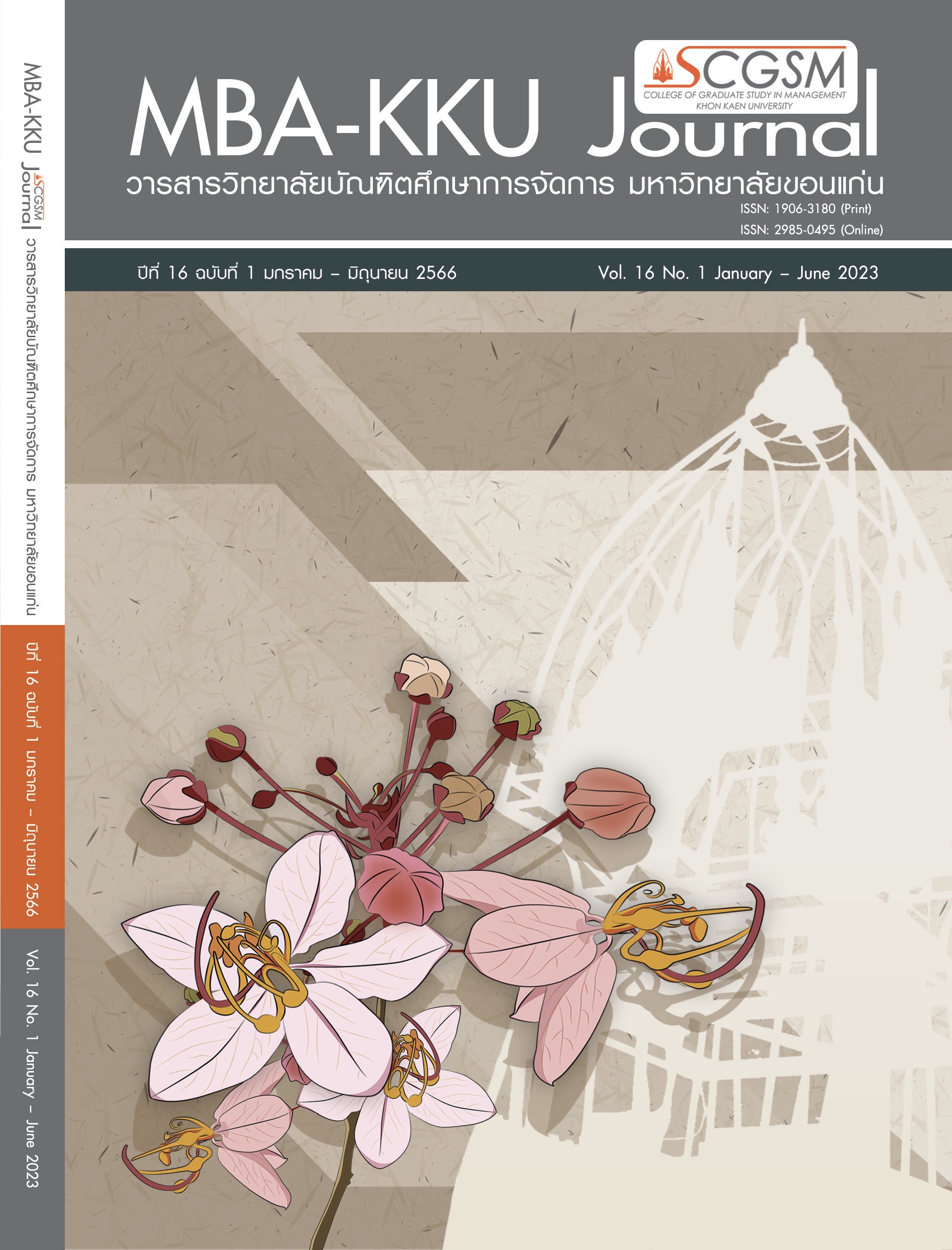Utilization of Radio Frequency Identification (RFID) Technology for Logistics Management of Thailand Post Company Limited
Main Article Content
Abstract
The utilization of Radio Frequency Identification (RFID) technology has become increasingly important for Thailand Post Company Limited as it aims to enhance its competitive potential and improve logistics efficiency in mail and parcel distribution. The objectives of this study are as follows: 1) to examine the relationship between RFID technology utilization in logistics management and its influence on the operational success of Thailand Post Company Limited, 2) to analyze the relationship between logistics management and its impact on the current operational performance of Thailand Post Company Limited, and 3) to investigate the supporting factors that influence the utilization of RFID technology and its impact on the operational performance of Thailand Post Company Limited. The sample group for this study was the Thailand Post Company Limited Center. After undergoing a thorough data cleaning process, a total of 152 companies' data were included in the analysis using Structural Equation Model analysis. The results indicated that the utilization of RFID technology had a positive effect on the operational performance of Thailand Post Company Limited. Furthermore, focusing on the business perspective and strategic planning in utilizing RFID technology demonstrated positive effects on operational efficiency. Additionally, the use of RFID technology positively impacted logistics management in terms of customer satisfaction, logistics competitiveness, speed, and reliability. Logistics management itself also exhibits positive effects on operational performance.
Article Details

This work is licensed under a Creative Commons Attribution-NonCommercial-NoDerivatives 4.0 International License.
- The ideas and opinions expressed in MBA-KKU Journal are those of the authors and not necessarily those of the editor.
- Copyright on any open access article in a journal published by MBA-KKU Journal
References
กรกฎ สรวลใจชื่น และกนกพร ชัยประสิทธิ์. (2022). อิทธิพลของประสิทธิภาพในการทำงานด้านโลจิสติกส์ที่ส่งผลต่อการตัดสินใจใช้บริการขนส่ง. Journal of Digital Business and Social Sciences, 8(2), 1-16.
บริษัท ไปรษณีย์ไทย จำกัด. (2561) รายงานประจำปี 2561 ค้นเมื่อ 2 พฤศจิกายน 2561, จาก https://file.thailandpost.com/upload/content/2561_5d5a058adfde8.pdf
ปิยะฉัตร จารุธีรศานต์. (2564).ปัจจัยในการแข่งขันด้านโลจิสติกส์ของผู้ประกอบการขนส่งในเขตภาคกลางของประเทศไทย. วารสารเครือข่ายส่งเสริมการวิจัยทางมนุษยศาสตร์และสังคมศาสตร์, 4(2), 19-32.
Asay, M. (2014). 8 Reasons Big Data Projects Fail. Retrieved 10 August 2022, From http://www.informationweek.com/big-data/big-data-analytics/8-reasons-big-data-projects-fail/a/d-id/1297842
Bunduchi, R., Weisshaar, C., & Smart, A. U. J. T. (2011). Mapping the benefits and costs associated with process innovation: The case of RFID adoption. Technovation, 31(9), 505-521.
Chalotra, V. (2016). Key Processes Adopted for Transportation Management System In Small Scale Firms. Parikalpana: KIIT Journal of Management, 12(1), 1.
Chiewnawin, P. (2009). Utilization of Radio Frequency Identification (RFID) Technology for Supply Chain Management of Automotive Parts Industry in Thailand. Doctoral dissertation, Mahidol University.
Coyle, J. J., Novack, R. A., Gibson, B. J., & Bardi, E. J. (2011). Transportation: a supply chain perspective. South-Western: Cengage Learning.
Fornel, C., & Larcker, D. (1981). Structural equation models with unobservable variables and measurement error: Algebra and statitics. Journal of Marketing Research, 25(2), 186-192.
Israel, G. D. (1992). Determining sample size. UNIVERSITY OF FLORIDA. Sheet PEOD-6 November 1992.
Jaska, P., Reyes, P., Zelbst, P. J., Green Jr, K. W., & Sower, V. E. (2010). Impact of RFID technology utilization on operational performance. Management Research Review, 33(10), 994-1004.
Joshi, A., Kale, S., Chandel, S., & Pal, D. K. (2015). Likert scale: Explored and explained. British journal of applied science & technology, 7(4), 396.
Nuchtiphong, U., Jaturat, N., & Kingsida, S. (2020). The Impact of RFID Utilization on Firms Performance through Decision Making of Automotive Manufacturers Industry. Progress in Applied Science and Technology, 10(1), 207-214.
Preston, C. (2013). Examining the Financial Vulnerability and Endowment Funds of Protestant Congregations: NORTHCENTRAL UNIVERSITY.
Raghuwanshi, K. (2010). Design & technology assessment of combined near & far field UHF RFID based specimen tracking & inventory management system. STATE UNIVERSITY OF NEW YORK AT STONY BROOK.
Zelbst, P. J., Green, K. W., Sower, V. E., & Reyes, P. M. (2012). Impact of RFID on manufacturing effectiveness and efficiency. International Journal of Operations & Production Management, 32(3), 329-350.
Zhao, W., Yu, Q.-q., Li, H.-s., & Tian, Y.-z. (2014). Study on the relationship between JIT practices and operational performance based on the cost leading strategy. Paper presented at the 2014 International Conference on Management Science & Engineering 21th Annual Conference Proceedings.


